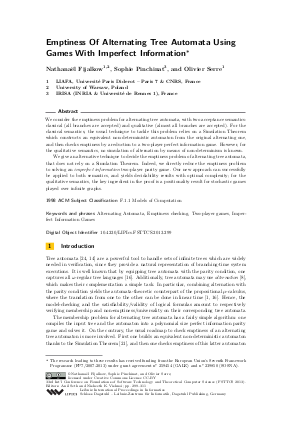Emptiness Of Alternating Tree Automata Using Games With Imperfect Information
Authors Nathanaël Fijalkow, Sophie Pinchinat, Olivier Serre
-
Part of:
Volume:
IARCS Annual Conference on Foundations of Software Technology and Theoretical Computer Science (FSTTCS 2013)
Part of: Series: Leibniz International Proceedings in Informatics (LIPIcs)
Part of: Conference: IARCS Annual Conference on Foundations of Software Technology and Theoretical Computer Science (FSTTCS) - License:
 Creative Commons Attribution 3.0 Unported license
Creative Commons Attribution 3.0 Unported license
- Publication Date: 2013-12-10
File

PDF
LIPIcs.FSTTCS.2013.299.pdf
- Filesize: 0.5 MB
- 13 pages
Document Identifiers
Subject Classification
Keywords
- Alternating Automata
- Emptiness checking
- Two-player games
- Imperfect Information Games
Metrics
- Access Statistics
-
Total Accesses (updated on a weekly basis)
0PDF Downloads0Metadata Views
Abstract
We consider the emptiness problem for alternating tree automata, with two acceptance semantics: classical (all branches are accepted) and qualitative (almost all branches are accepted). For the classical semantics, the usual technique to tackle this problem relies on a Simulation Theorem which constructs an equivalent non-deterministic automaton from the original alternating one, and then checks emptiness by a reduction to a two-player perfect information game. However, for the qualitative semantics, no simulation of alternation by means of non-determinism is known. We give an alternative technique to decide the emptiness problem of alternating tree automata, that does not rely on a Simulation Theorem. Indeed, we directly reduce the emptiness problem to solving an imperfect information two-player parity game. Our new approach can successfully be applied to both semantics, and yields decidability results with optimal complexity; for the qualitative semantics, the key ingredient in the proof is a positionality result for stochastic games played over infinite graphs.
Cite As Get BibTex
Nathanaël Fijalkow, Sophie Pinchinat, and Olivier Serre. Emptiness Of Alternating Tree Automata Using Games With Imperfect Information. In IARCS Annual Conference on Foundations of Software Technology and Theoretical Computer Science (FSTTCS 2013). Leibniz International Proceedings in Informatics (LIPIcs), Volume 24, pp. 299-311, Schloss Dagstuhl – Leibniz-Zentrum für Informatik (2013)
https://doi.org/10.4230/LIPIcs.FSTTCS.2013.299
BibTex
@InProceedings{fijalkow_et_al:LIPIcs.FSTTCS.2013.299,
author = {Fijalkow, Nathana\"{e}l and Pinchinat, Sophie and Serre, Olivier},
title = {{Emptiness Of Alternating Tree Automata Using Games With Imperfect Information}},
booktitle = {IARCS Annual Conference on Foundations of Software Technology and Theoretical Computer Science (FSTTCS 2013)},
pages = {299--311},
series = {Leibniz International Proceedings in Informatics (LIPIcs)},
ISBN = {978-3-939897-64-4},
ISSN = {1868-8969},
year = {2013},
volume = {24},
editor = {Seth, Anil and Vishnoi, Nisheeth K.},
publisher = {Schloss Dagstuhl -- Leibniz-Zentrum f{\"u}r Informatik},
address = {Dagstuhl, Germany},
URL = {https://drops.dagstuhl.de/entities/document/10.4230/LIPIcs.FSTTCS.2013.299},
URN = {urn:nbn:de:0030-drops-43812},
doi = {10.4230/LIPIcs.FSTTCS.2013.299},
annote = {Keywords: Alternating Automata, Emptiness checking, Two-player games, Imperfect Information Games}
}
